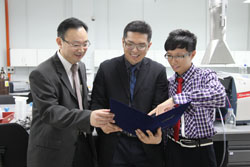KUCHING – A doctoral candidate from Swinburne University of Technology Sarawak Campus has been awarded for best paper at an international conference which was held in Qingdao, China recently.
The 2nd International Conference on Convergence Technology 2012, organised by Korea Convergence Society, awarded Wong Wei Jing, and his co-authors Associate Professor Dennis Wong and Dr Yau Hee Kho, for their paper on “A low complexity multi-line code for cancellable fingerprint template”.
Wong’s paper suggests a new solution for generating replaceable or cancellable fingerprint metrics so that it can be reissued in case of a security breach of the fingerprint database.
“Although biometric authentication such as fingerprint, iris, face, voice, and signature and so on provides a higher level of security over traditional password-based authentication, the biometric data is irreplaceable once it is stolen as a person’s biometric traits are permanent and unique,” he said.
Biometrics is the practice of digitally scanning the physiological or behavioural characteristics of individuals as a means of identification.
“The solution I proposed at the conference not only helps to enhance the security of conventional biometric authentication systems but also yields better recognition accuracy,” Wong said.
He said the proposed solution uses a state-of-the-art fingerprint method and comprehensive experiments carried out have proven that the proposed scheme execute faster than known alternatives while achieving comparable performances.
Wong, who graduated with a first class honours degree in bachelors of engineering majoring in electronics and computer systems from Swinburne Sarawak, is currently pursuing a doctorate at his alma mater with a full scholarship.
His research interests include biometric recognition, specifically fingerprint, and information security. Wong’s next focus will be to marry the two fields and utilise the proposed scheme to replace software passwords in enhancing the security of existing information systems.
All Malaysian identity cards and e-passports now carry raw fingerprint data as the means for biometric authentication. Current technology allows reconstruction of fake fingerprints from raw fingerprint data.
Wong’s research, therefore, would add much value to the next generation of physical and cyber securities.


